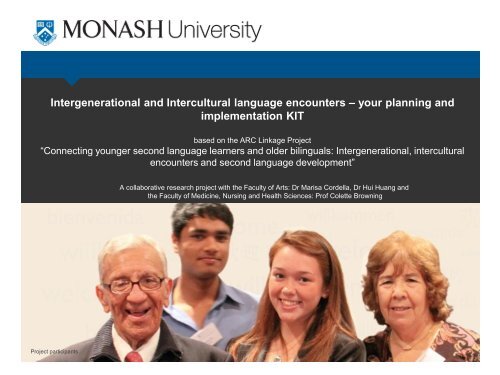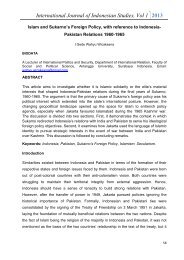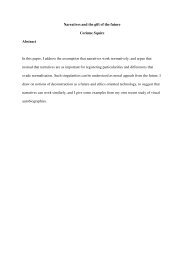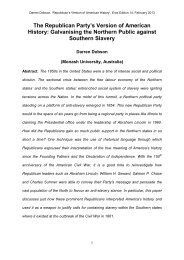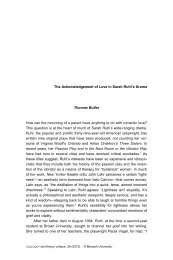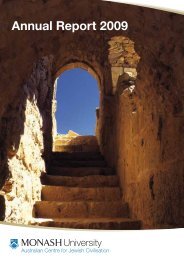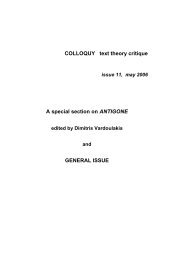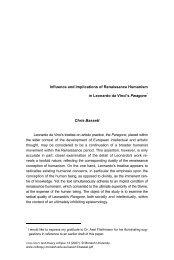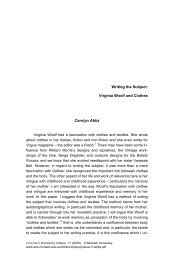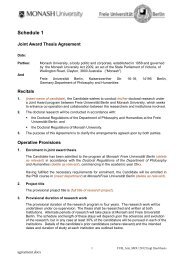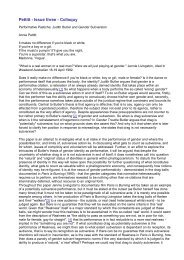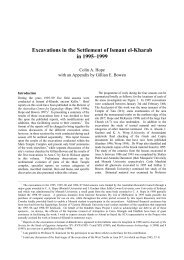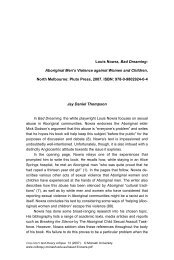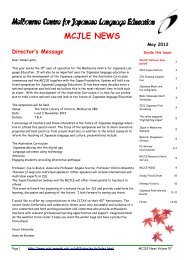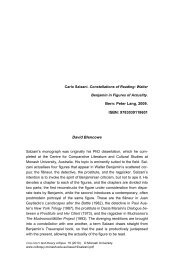Intergenerational and Intercultural language encounters
Intergenerational and Intercultural language encounters
Intergenerational and Intercultural language encounters
You also want an ePaper? Increase the reach of your titles
YUMPU automatically turns print PDFs into web optimized ePapers that Google loves.
<strong>Intergenerational</strong> <strong>and</strong> <strong>Intercultural</strong> <strong>language</strong> <strong>encounters</strong> – your planning <strong>and</strong>implementation KITbased on the ARC Linkage Project“Connecting younger second <strong>language</strong> learners <strong>and</strong> older bilinguals: <strong>Intergenerational</strong>, intercultural<strong>encounters</strong> <strong>and</strong> second <strong>language</strong> development”A collaborative research project with the Faculty of Arts: Dr Marisa Cordella, Dr Hui Huang <strong>and</strong>the Faculty of Medicine, Nursing <strong>and</strong> Health Sciences: Prof Colette BrowningProject participants
Structure of this KIT1 Summary of the research project “Connecting younger second <strong>language</strong>learners <strong>and</strong> older bilinguals: <strong>Intergenerational</strong>, intercultural <strong>encounters</strong> <strong>and</strong>second <strong>language</strong> acquisition”2 Benefits: Who will enjoy participating in this program? And why?3 Setting up an <strong>Intergenerational</strong> <strong>and</strong> <strong>Intercultural</strong> <strong>language</strong> <strong>encounters</strong>program in your community: A 4 step process4 Running an <strong>Intergenerational</strong> <strong>and</strong> <strong>Intercultural</strong> <strong>language</strong> <strong>encounters</strong> program:Are you a <strong>language</strong> teacher <strong>and</strong> interested in connecting your students witholder speakers to enhance their <strong>language</strong> learning experience?5 Resources <strong>and</strong> templates6 Acknowledgmentpage 3-4page 5page 6page 7-8page 9-24page 252
1 Summary of the research project “Connecting younger second <strong>language</strong>learners <strong>and</strong> older bilinguals: <strong>Intergenerational</strong>, intercultural <strong>encounters</strong><strong>and</strong> second <strong>language</strong> acquisition” (2010-2012) (page 1 of 2)This KIT originates from a research project which was funded by the AustralianResearch Council from 2010 to 2012. It brings together students of Chinese,German or Spanish with older speakers of the <strong>language</strong>, promoting mutuallybeneficial intercultural, intergenerational <strong>encounters</strong>.Regular meetings offer students real interaction with target <strong>language</strong> speakers<strong>and</strong> enhance their communicative competence. At the same time these meetingsincrease seniors‟ social activities <strong>and</strong> improve their quality of life.This initiative of connecting community members from different generations <strong>and</strong>different cultural backgrounds has a positive impact on the social fabric of theAustralian society. It fills a gap in recent trends that show a decline in voluntarywork <strong>and</strong> an erosion of individual connectedness in Australia. This project fosterscommunity engagement <strong>and</strong> social cohesion in a multicultural society. It shapesfuture attitudes <strong>and</strong> interactions across multicultural communities as is shown onthe project website <strong>and</strong> in publications.3
1 Summary of the research project “Connecting younger second <strong>language</strong>learners <strong>and</strong> older bilinguals: <strong>Intergenerational</strong>, intercultural <strong>encounters</strong><strong>and</strong> second <strong>language</strong> acquisition” (2010-2012) (page 2 of 2)On this website you find background information about the researchproject, pictures, testimonials <strong>and</strong> feedback from participants in action,current project activities, results, benefits <strong>and</strong> lots of inspiration!www.arts.monash.edu.au/intergenerationalThis KIT has been designed for you to set up <strong>and</strong> run a similar program.The necessary steps, important contacts <strong>and</strong> procedures are clearlyoutlined <strong>and</strong> adaptable templates are provided.4
2 Benefits: Who will enjoy participating in this program? And why?I want to increasestudents‟ opportunities inengaging in authentic<strong>and</strong> natural interaction.LanguageteachersSeniorsspeaking other<strong>language</strong>sthan EnglishLocalcouncils/CommunityorganisationsLanguagestudentsThis projects brings benefits to a wide range of community members by connecting seniors <strong>and</strong> students.Seniors can share their knowledge with young people. Young <strong>language</strong> students have increasedopportunities to talk <strong>and</strong> interact in the <strong>language</strong> they are learning. It is a way to actively engage <strong>and</strong>connect members of the community for local councils <strong>and</strong> community organisations.This KIT has been designed for <strong>language</strong> teachers <strong>and</strong> provides assistance in setting up a similar project inyour school.5
3 Setting up an <strong>Intergenerational</strong> <strong>and</strong> <strong>Intercultural</strong> <strong>language</strong> <strong>encounters</strong>program: A 4 step processStep 1 + Step 2: Engage students who are learning another <strong>language</strong> <strong>and</strong> find seniors who speak the<strong>language</strong> the students are learningStep 3: Pair students <strong>and</strong> seniorsStep 4: Let students <strong>and</strong> seniors meet <strong>and</strong>converse in the target <strong>language</strong> regularly6
4 Running an <strong>Intergenerational</strong> <strong>and</strong> <strong>Intercultural</strong> <strong>language</strong> <strong>encounters</strong> program: Areyou a <strong>language</strong> teacher <strong>and</strong> interested in connecting your students with olderspeakers to enhance their <strong>language</strong> learning experience? (page 1 of 2)Get your principal‟s support to set up the project in your school. Refer to theproject website for feedback from participants <strong>and</strong> benefits for the students‟<strong>language</strong> learning.Contact your <strong>language</strong> consultant within the DEECD or ISV to indicateyour interest <strong>and</strong> to find out about schools or communities involved insimilar programs in your area.Calculate costs <strong>and</strong> discuss them with your principal. Apply for funding ifnecessary.Contact community groups <strong>and</strong> local councils to find out about interestedseniors in your area. Organise a police check <strong>and</strong> a working with childrencheck for seniors. Organise transport <strong>and</strong> travel reimbursement.7
4 Running an <strong>Intergenerational</strong> <strong>and</strong> <strong>Intercultural</strong> <strong>language</strong> <strong>encounters</strong> program: Areyou a <strong>language</strong> teacher <strong>and</strong> interested in connecting your students with olderspeakers to enhance their <strong>language</strong> learning experience? (page 2 of 2)Encourage students to immerse themselves in this unique <strong>and</strong> very effectiveopportunity to enhance their <strong>language</strong> proficiency <strong>and</strong> contribute to socialinclusion. Inform the your school community about the project.Assist the student <strong>and</strong> senior pairs in setting up a regular date, time <strong>and</strong>space to meet <strong>and</strong> develop a list of topics <strong>and</strong> hints with your student thatsupports their VCE curriculum.Exchange your experiences with other teachers <strong>and</strong> motivate them toimplement this program in their classes.8
5 Resources <strong>and</strong> templates (page 1 of 16):More informationResearch Project:„Connectingyounger second<strong>language</strong> learners<strong>and</strong> olderbilinguals‟(Monash University2010-2012)Project websitehttp://www.arts.monash.edu.au/intergenerational/Dr Marisa Cordella (Spanish),Marisa.Cordella@monash.eduDr Hui Huang (Chinese),Hui.Huang@monash.eduMs Ramona Baumgartner (German),Ramona.Baumgartner@monash.edu9
5 Resources <strong>and</strong> templates (page 2 of 16):Language consultantsDepartment of Education<strong>and</strong> Early ChildhoodDevelopment (DEECD),Languages Education UnitIndependent SchoolsVictoria (ISV)http://www.education.vic.gov.au/studentlearning/teachingresources/lote/proflearn.htmhttp://www.independentschools.vic.edu.au/10
5 Resources <strong>and</strong> templates (page 3 of 16):Community groupsVictorian Multicultural CommissionCommunity Resource DirectoryCouncil on the AgeingFederation of Ethnics' communitiescouncil in AustraliaEthnic communities council of VictoriaMunicipal Association of VictoriaLocal councilshttp://www.multicultural.vic.gov.au/http://www.multicultural.vic.gov.au/resources/community-directoryhttp://www.cotavic.org.au/http://www.fecca.org.au/http://www.eccv.org.au/contacthttp://www.mav.asn.au/policyservices/social-community/multicultural/Pages/default.aspxCultural Diversity Officers/ CommunityDevelopment Officers/ MulticulturalLiaison Officer etc.11
5 Resources <strong>and</strong> templates (page 4 of 16):FundingOffice of Multicultural Affairs <strong>and</strong>CitizenshipCommunity GrantsVolunteering VictoriaCommunity grants databaseSeniors online (Participation for CALDSeniors – small grant program)http://www.multicultural.vic.gov.au/grants/application-formshttp://www.volunteeringvictoria.com.au/grants-<strong>and</strong>-funding/228-grants-<strong>and</strong>-fundinginformation-onlinehttp://www.ourcommunity.com.au/funding/grant_main.jspwww.seniorsonline.vic.gov. au12
5 Resources <strong>and</strong> templates (page 5 of 16):Police checksVictoria PoliceVolunteering Victoriahttp://www.police.vic.gov.au/content.asp?Document_ID=274http://www.volunteeringvictoria.com.au/volunteer-information/86-working-with-childrencheckhttp://www.volunteeringvictoria.com.au/volunteer-information/86-working-with-childrencheckHow to organise police checks• Enquire about a community volunteer fee number (VCF) with Victoria Police• Find out current cost of a Police Check• Inform participants about how to complete the police check (requireddocuments, where to get documents certified, where to send the application to)• If necessary assist participants in completion of police check13
5 Resources <strong>and</strong> templates (page 6 of 16):Working with children checksDepartment of JusticeAustralia PostVolunteering Victoriahttp://www.justice.vic.gov.au/wps/wcm/connect/justlib/working+with+children/home/about+the+check/what+is+checked/wwcc+-+applicants+-+faqshttp://apps.nowwhere.com.au/austpost/PostOfficeLocator/default.aspxhttp://www.volunteeringvictoria.com.au/volunteer-information/86-working-with-children-checkhttp://www.volunteeringvictoria.com.au/volunteer-information/86-working-with-children-checkHow to organise working with children checks• Check the website about the current procedure• Inform participants about how to complete the working with children check (required documents,nearest post office, arrange time <strong>and</strong> date, costs for photo, procedure, include your schools‟ detailsin application <strong>and</strong> you will receive a copy of the completed check• If necessary assist participants with the completion of working with children check14
5 Resources <strong>and</strong> templates (page 7 of 16):TransportKingston AgeFriendly TransportProjecthttp://www.vcta.org.au/2011conference/KAFTP%20presentation%20for%20Comm%20Tsp%20Forum.pdf/15
5 Resources <strong>and</strong> templates (page 8 of 16):• Teacher• Students• Seniors– Checklist teacher• Steps to have completed before the program can roll out– Checklist seniors-students• Keep a record of required paperwork for each participant– Pair list <strong>and</strong> contact list seniors• Your participants database– Schedule students• Your sessions database– Plan students• Students keep a record of the sessions <strong>and</strong> their learning experience– Information sheet parents• Gives parents background information <strong>and</strong> includes consent form– Information sheet students• Informs students about meeting day, time, venue, time frame <strong>and</strong> topics– Information sheet seniors• Gives seniors information about logistics, contact details <strong>and</strong> schedulepage 17page 18page 19page 20page 21page 22page 23page 2416
5 Resources <strong>and</strong> templates (page 9 of 16): Checklist teacher<strong>Intergenerational</strong> <strong>and</strong> <strong>Intercultural</strong> <strong>language</strong> <strong>encounters</strong>program – checklist teacherSchool community□ The school‟s principal is supporting this project□ Venues for meetings have been set up <strong>and</strong> staff who is directly/indirectly involved have beeninformed (e.g. librarians)□ The school community has been informed about the meetings <strong>and</strong> will welcome the seniorsto the school community□ _________________________________________________________________________Seniors□ Seniors have Police Check□ Seniors have Working with Children Check□ Transport for seniors is organised□ Seniors‟ contact details are added to database□ Information sheet with details about time, dates, venue, time frame <strong>and</strong> topics are sent toseniors□ _________________________________________________________________________Students□ Information sheet has been sent out to parents□ Consent forms have been collected□ Students are paired with seniors□ A regular time in the students‟ timetable has been set aside for the meetings□ Conversation topics have been established with the students□ Regular debriefing sessions have been scheduled with the students□ Students have information sheet with details about time, dates, venue, time frame <strong>and</strong> topics□ Students have student plan template□ _________________________________________________________________________Miscellaneous□ _________________________________________________________________________17
5 Resources <strong>and</strong> templates (page 10 of 16): Checklist seniorsstudents<strong>Intergenerational</strong> <strong>and</strong> <strong>Intercultural</strong> <strong>language</strong> <strong>encounters</strong> program –Checklist seniorsSeniorsWorkingwithchildrencheckPoliceCheckContactdetailsInformationSheetPairlist TransportCarlos Y √ √ √ √ √ √StudentsPeter X<strong>Intergenerational</strong> <strong>and</strong> <strong>Intercultural</strong> <strong>language</strong> <strong>encounters</strong> program –Checklist studentsConsent StudentInformationform Plan Schedule SheetPair list√ √ √ √ √18
5 Resources <strong>and</strong> templates (page 11 of 16): Pair list <strong>and</strong> contact listseniorsStudent‟sName:<strong>Intergenerational</strong> <strong>and</strong> <strong>Intercultural</strong> <strong>language</strong> <strong>encounters</strong> –Pair list <strong>and</strong> contact list seniorsSenior:Phone No.:Address:NotesStudent‟sName:NotesSenior:Phone No.:Address:Student‟sName:NotesSenior:Phone No.:Address:Student‟sName:NotesSenior:Phone No.:Address:Student‟sName:NotesSenior:Phone No.:Address:19
5 Resources <strong>and</strong> templates (page 12 of 16): Schedule studentsStudent <strong>and</strong>Senior:Peter X <strong>and</strong>Carlos Y<strong>Intergenerational</strong> <strong>and</strong> <strong>Intercultural</strong> <strong>language</strong> <strong>encounters</strong> program –Schedule studentsStudent <strong>and</strong>Senior:Student <strong>and</strong>Senior:Student <strong>and</strong>Senior:Student <strong>and</strong>Senior:Student <strong>and</strong>Senior:Student <strong>and</strong>Senior:Day:Mondaysweek ATime: 2-3pmDay:Time:Day:Time:Day:Time:Day:Time:Day:Time:Day:Time:Meeting TopicVenue1: Library Venue: Venue: 2 Venue: 3 Venue: 4 Venue: Venue:1 Introduction 15/03/20122 Familiy 29/03/20123 … …4 … …Debrief: Beg. ofMayDebrief Debrief Debrief Debrief Debrief Debrief5 … …6 … …7 … …8 … …9 … …10 Debrief: End of June Debrief Debrief Debrief Debrief Debrief Debrief20
5 Resources <strong>and</strong> templates (page 13 of 16): Plan students<strong>Intergenerational</strong> <strong>and</strong> <strong>Intercultural</strong> <strong>language</strong> <strong>encounters</strong> -Plan StudentDetailsMy nameMy senior partner's nameNUMBER OF SESSIONSSession 1Date <strong>and</strong> Venue Topic What did I expect? What did I learn? NotesSession 2Date <strong>and</strong> Venue Topic What did I expect? What did I learn? NotesSession 3Date <strong>and</strong> Venue Topic What did I expect? What did I learn? NotesSession 4Date <strong>and</strong> Venue Topic What did I expect? What did I learn? Notes21
5 Resources <strong>and</strong> templates (page 14 of 16): Information sheet parents<strong>Intergenerational</strong> <strong>and</strong> <strong>Intercultural</strong> <strong>language</strong> <strong>encounters</strong> program –Information sheet parents[School logo][Type parents’ names]«AddressBlock»«GreetingLine»1. Write information <strong>and</strong> background about the program. Include benefits for students.2. Inform about the logistics of the program (How many meetings, intervals, time frame, timetableslot).3. (Insert your contact details.)4. Attach tear off section that asks for parents’ consent.[Type the closing][Attach tear off section]22
5 Resources <strong>and</strong> templates (page 15 of 16): Information sheet students<strong>Intergenerational</strong> <strong>and</strong> <strong>Intercultural</strong> <strong>language</strong> <strong>encounters</strong> program –Information sheet students[School logo][Type student’s name]«AddressBlock»«GreetingLine»1. Thank student for participation. Remind student of commitment.2. Insert partner’s name, meeting day, time, venue, time frame <strong>and</strong> topics.3. Refer to attached plan.[Type the closing][Attach plan]23
5 Resources <strong>and</strong> templates (page 16 of 16): Information sheet seniors<strong>Intergenerational</strong> <strong>and</strong> <strong>Intercultural</strong> <strong>language</strong> <strong>encounters</strong> program –Information sheet seniors[School logo][Type senior’s name]«AddressBlock»«GreetingLine»1. Thank senior for participation.2. Insert partner’s name, meeting day, venue <strong>and</strong> address of school.3. Insert list of dates <strong>and</strong> topics.4. Insert your contact details <strong>and</strong> refer to attached map.[Type the closing][Attach map of school]24
6 AcknowledgmentFirstly, we would like to thank the Australian Research Council (ARC) for the Linkage grant (2010-2012), that made theresearch project „Connecting younger second <strong>language</strong> learners <strong>and</strong> older bilinguals: <strong>Intergenerational</strong>, intercultural<strong>encounters</strong> <strong>and</strong> second <strong>language</strong> development‟ possible.We would like to acknowledge the following three schools, their staff <strong>and</strong> the volunteers who brought the ARC Linkageproject to life. Their participation, commitment <strong>and</strong> motivation are an inspiration to all future participants <strong>and</strong> organisers:• Caulfield Grammar School, Wheelers Hill: Their principal, their Chinese <strong>and</strong> German teachers <strong>and</strong> LOTE coordinators<strong>and</strong> Year 11 <strong>and</strong> Year 12 students in 2010-2012.• Glen Waverley Secondary College, Glen Waverley: Their principal, their Chinese teachers <strong>and</strong> LOTE coordinators <strong>and</strong>Year 11 <strong>and</strong> Year 12 students in 2010-2012.• Wantirna College, Wantirna: Their principal, their Spanish teacher <strong>and</strong> Year 11 <strong>and</strong> Year 12 students in 2010-2012.• All Chinese speaking, German speaking <strong>and</strong> Spanish speaking senior volunteers.We would also like to thank the four partner organisations <strong>and</strong> their representatives for their contributions, support <strong>and</strong>advice: Council on the Ageing, Department of Education <strong>and</strong> Early Childhood Development, Independent Schools Victoria<strong>and</strong> Office of Multicultural Affairs <strong>and</strong> Citizenship.Finally, we would like to pay tribute to the initiator of the ARC Linkage Project, the late Professor Michael Clyne. All futureprograms will continue his legacy as a pioneer <strong>and</strong> tireless advocate of multilingualism in multicultural societies.© Monash University March 2012.Pictures: All pictures were taken as part of the ARC Linkage Project. They are published with participants‟ <strong>and</strong> teachers‟ consent.Monash University reserves the right to alter information, procedures, fees <strong>and</strong> regulations contained in this document. Please check the Monash University website for updates(www.monash.edu.au). All information reflects prescriptions, policy <strong>and</strong> practice in force at time of publication. Published March 2012.25


